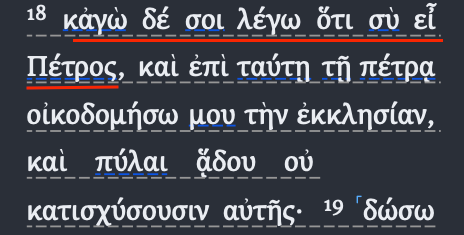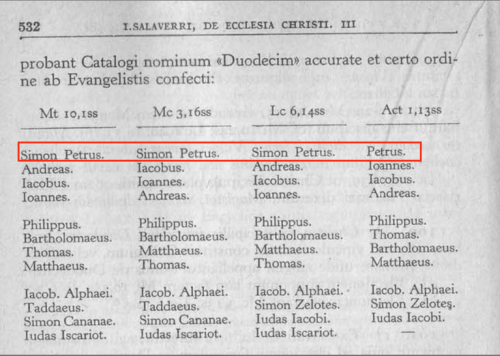
Truth - Goodness - Beauty - Order Posting things Catholic, philosophical, aesthetical, and natural.
154 posts
Christ Jesus Is The Sublime Ideal Of All Holiness, The Divine Model Presented By God Himself To The Imitation
Christ Jesus is the sublime Ideal of all holiness, the Divine Model presented by God Himself to the imitation of His elect. Christian holiness consists in the complete and sincere acceptation of Christ by faith, and in the expansion of this faith by hope and charity; it implies the stable and total hold exercised by Christ upon our activity through the supernatural influence of His Spirit. Christ Jesus, the Alpha and Omega of all our works, becomes by the communication of His own life, the very life of our souls: Mihi vivere Christus est.
Dom Marmion, Christ the Ideal of the Monk, vii
More Posts from Guelphicreaction

Sacrament of Eucharist (from Seven Sacraments Altarpiece), 1445-1550
Rogier van der Weyden, 1399-1464
Royal Museums of Fine Arts, Antwerp, Belgium




The Roman Primacy
The foundation of the papacy is the supremacy of St. Peter in the College of Apostles. This supremacy was established by Jesus Christ outside of Caesarea Philippi, and is recorded by St. Matthew.
And Jesus came into the quarters of Caesarea Philippi: and he asked his disciples, saying: Whom do men say that the Son of man is? But they said: Some John the Baptist, and other some Elias, and others Jeremias, or one of the prophets. Jesus saith to them: But whom do you say that I am? Simon Peter answered and said: Thou art Christ, the Son of the living God. And Jesus answering, said to him: Blessed art thou, Simon Bar-Jona: because flesh and blood hath not revealed it to thee, but my Father who is in heaven. And I say to thee: That thou art Peter; and upon this rock I will build my church, and the gates of hell shall not prevail against it. And I will give to thee the keys of the kingdom of heaven. And whatsoever thou shalt bind upon earth, it shall be bound also in heaven: and whatsoever thou shalt loose upon earth, it shall be loosed also in heaven. Mt. 16:13-19
The key to this passage is Christ's response, THOU art Peter. In ancient languages, such as Greek, pronouns are rarely used, because the verb conjugations make it obvious whom you are speaking to. So they are only used for emphasis.

Transliterated, it says, "kago de SOI lego hoti SU ei Petros..." I say to THEE, that THOU art Peter. So, in this conversation, Christ is making it obvious that He is specifically referring to Simon, whom He renames Peter.
In Scripture, God's changing of a person's name is a big deal. It is a sign of a special vocation or mission. The name change reflects what God specifically wants that person to do.
The classic examples were God's changing Abram's name to Abraham, because he would be the father of many nations, and His changing of Jacob's name to Israel, because Jacob had "overcome" God (by God's permission) which would symbolize that the People of Israel would "overcome" God by prayer.
There are no other Apostles whose names were changed by Christ.In this passage, Christ renames Simon "Peter" (which means rock) because He intends St. Peter to be the rock of the Church. Specifically, Peter is to be the rock because he made the profession of faith in Christ's divinity. Thus, Peter is the Apostle whose faith will not fail, and who will confirm the brethren in the faith throughout the ages.
And the Lord said: Simon, Simon, behold Satan hath desired to have you, that he may sift you as wheat: But I have prayed for thee, that thy faith fail not: and thou, being once converted, confirm thy brethren. Lk. 22:31-32
The third instance in Scripture is after Christ's resurrection, where He meets the disciples along the coast of the Sea of Galilee. There, He confirms St. Peter's mission as chief pastor of Christianity.
When therefore they had dined, Jesus saith to Simon Peter: Simon son of John, lovest thou me more than these? He saith to him: Yea, Lord, thou knowest that I love thee. He saith to him: Feed my lambs. He saith to him again: Simon, son of John, lovest thou me? He saith to him: Yea, Lord, thou knowest that I love thee. He saith to him: Feed my lambs. He said to him the third time: Simon, son of John, lovest thou me? Peter was grieved, because he had said to him the third time: Lovest thou me? And he said to him: Lord, thou knowest all things: thou knowest that I love thee. He said to him: Feed my sheep. Jn. 21:15-17
Once again, this commission to feed the sheep and the lambs is to St. Peter alone. It is not given to any other Apostle. Therefore Christ had commissioned St. Peter to be the supreme pastor of the faithful, of the followers of Christ.
The notion of being a shepherd or pastor signifies power and control. A shepherd guides his sheep, telling them where to go. He protects them from wolves and thieves. He feeds them and makes sure they are healthy. All of the Apostles have this role generically, but to St. Peter alone was it given to do this universally and with the highest authority, as this commission came from Christ explicitly.
Further, Christ tells St. Peter to feed "my lambs and my sheep." This means that St. Peter is the universal pastor. He governs everyone. Some have interpreted that "sheep" mean laity, and "lambs" clergy, meaning that St. Peter is the supreme pastor over both clergy and laity.
Next, we take a step back and look at Sacred Scripture itself. It is clear from the very writing of Scripture that St. Peter is the leader of the Apostles. In every single instance where all the Apostles are listed, St. Peter is at the top of the list. There are no exceptions. Other Apostles move around the list to some degree, but St. Peter is always first.

--
The early Church testifies to the supremacy of St. Peter, who established his pontificate in the city of Rome in virtue of his martyrdom. By the end of the first century, a dispute had arisen in the city of Corinth over some disciplinary matter. (St. Paul had written two epistles to the Corinthians, who are natives of Corinth.) This church, in order to resolve its dispute, did not consult Jerusalem, Antioch, Alexandria, or even Smyrna, wher St. Polycarp was a bishop. (St. Polycarp was the disciple of St. John the Evangelist.) Rather, the Corinthians consulted the Bishop of Rome, the Pope, to resolve this issue. At the time, this was St. Clement of Rome. The fact that they bypassed so many local eastern clergy to go straight to Rome argues in favor of the Roman supremacy in the Church, even by the year 100 AD.
In his response, St. Clement commands the Corinthians to stop quarreling and to obey their priests. He puts an end to the dispute. This also does not argue in favor of a primacy of honor only, but rather a primacy of authority. St. Clement's word was final because the Pope's word is final.
You therefore, who laid the foundation of this sedition, submit yourselves to the presbyters, and receive correction so as to repent, bending the knees of your hearts. Epistle of St. Clement
--
Next, here are quotations from Eastern Fathers on the Papacy:
Since to Peter was handed over the complete responsibility of feeding the sheep, and since upon him the Church was founded, as if upon the ground, no other confession of virtue is required of him except that of charity. Origin, commenting on St. Paul's Epistle to the Romans
Jesus said to him: Feed my sheep... and committed to him the command of his brothers. St. John Chrysostom, Hom. 88
Nor does the kingdom of heaven belong to sleepers and sluggards, but the violent take it by force (Mt. 11:12). Therefore on hearing those words, the blessed Peter, the chosen, the pre-eminent, the first of the disciples, for whom alone and Himself the Savior paid tribute, quickly seized and comprehended the saying. And what does he say? Lo, we have left all and followed Thee (Mt. 19:27, Mk. 10:28). St. Clement of Alexandria, "Who is the rich man that shall be saved?" Ch. 21
--
Finally, for those who are Catholics, here are the pronouncements of the First Vatican Council, 1870. (Denzinger 1822)
So we teach and declare that according to the testimonies of the Gospel the primacy of jurisdiction over the entire Church of God was promised and was conferred immediately and directly upon the blessed Apostle Peter by Christ the Lord. For the one Simon, to whom He had before said: "Thou shalt be called Cephas" [John 1:42], after he had given forth his confession with those words: "Thou art Christ, Son of the living God" [Matt. 16:16], the Lord spoke with these solemn words: "Blessed art thou, Simon Bar Jona; because flesh and blood hath not revealed it to thee, but my Father who is in heaven. And I say to thee: That thou art Peter, and upon this rock I will build my church, and the gates of hell shall not prevail against it: and I shall give to thee the keys of the kingdom of heaven. And whatsoever thou shalt bind upon earth, it shall be bound also in heaven: and whatsoever thou shalt loose upon earth, it shall be loosed also in heaven" [Matt. 16:17 ff.]. [against Richerius etc. (see n. 1503)]. And upon Simon Peter alone Jesus after His resurrection conferred the jurisdiction of the highest pastor and rector over his entire fold, saying: "Feed my lambs," "Feed my sheep" [John 21:15 ff.]. To this teaching of Sacred Scriptures, so manifest as it has been always understood by the Catholic Church, are opposed openly the vicious opinions of those who perversely deny that the form of government in His Church was established by Christ the Lord; that to Peter alone, before the other apostles, whether individually or all together, was confided the true and proper primacy of jurisdiction by Christ; or, of those who affirm that the same primacy was not immediately and directly bestowed upon the blessed Peter himself, but upon the Church, and through this Church upon him as the minister of the Church herself.
And, finally, an anathema from the Catholic Church. (Denzinger 1823)
If anyone then says that the blessed Apostle Peter was not established by the Lord Christ as the chief of all the apostles, and the visible head of the whole militant Church, or, that the same received great honor but did not receive from the same our Lord Jesus Christ directly and immediately the primacy in true and proper jurisdiction: let him be anathema. Si quis igitur dixerit, beatum Petrum apostolum non esse a Christo Domino constitutum apostolorum omnium principem et totius ecclesiae militantis visibile caput; vel eundem honoris tantum, non autem verae propriaeque iurisdictionis primatum ab eodem Domino nostro Iesu Christo directe et immediate accepisse; anathema sit.
![[ DARK COTTAGECORE ]](https://64.media.tumblr.com/d4062e4c2ea7c2c9f4f59eb3edfa4ddc/d3ab8d147df96151-19/s500x750/eb67895b3fe24406d3ba92b476c61d56d52a5847.jpg)
![[ DARK COTTAGECORE ]](https://64.media.tumblr.com/346fcfd79fe0e42542be99cd711f9410/d3ab8d147df96151-fa/s400x600/456e6f94c846a1e6638636ffb95ef8c0c66035ae.jpg)
![[ DARK COTTAGECORE ]](https://64.media.tumblr.com/0acf4c4d52efa615240feb6255a14e20/d3ab8d147df96151-79/s500x750/0bd89404bf28eb55e7b3365d7a65c69705e77bfa.jpg)
![[ DARK COTTAGECORE ]](https://64.media.tumblr.com/0253eed2b3d6bf16aefb7e49bff2fb68/d3ab8d147df96151-64/s500x750/8d98a7fdbbb63cfccdf6134e4e1d8a4f49e2d1d9.jpg)
![[ DARK COTTAGECORE ]](https://64.media.tumblr.com/b7954a6ac311eae20d3ed11a120149e9/d3ab8d147df96151-9f/s500x750/443cf94a2933d361665279b892bb7812296e4546.jpg)
![[ DARK COTTAGECORE ]](https://64.media.tumblr.com/eaa3c116954bbe7a1e84aec3d8895607/d3ab8d147df96151-b0/s500x750/d24db679d06c6feaa8c70604659711bdb402cdbb.jpg)
[ DARK COTTAGECORE ]

Sunset